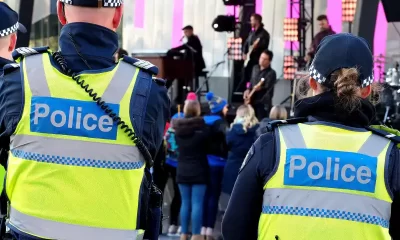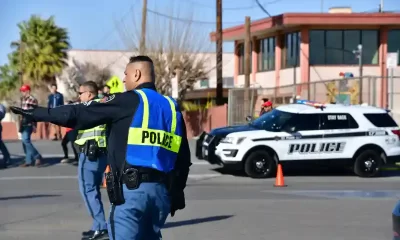Business
The Life and Drug Trade of Vladimiro Montesinos: Peru’s Shadiest Drug Trafficker

Years after his unmasking, Montesinos’ legacy continues to divide Peruvian society in half.
In December, Peru’s president, Pedro Castillo, tried to shut down congress to prevent its members from impeaching him. His orders were not obeyed, and hours later he was arrested on charges of rebellion and conspiracy. Awaiting trial, Castillo is believed to be held in a police prison in Lima – the same police prison that houses another former Peruvian leader, Alberto Fujimori.
Fujimori, the son of Japanese immigrants, served as president from 1990 until 2000. Like Castillo, he tried to shut down congress while in office. But unlike Castillo, he succeeded. Backed by the army, Fujimori completely rewrote the country’s constitution, and might have remained in power indefinitely had he not been persecuted and imprisoned for human rights violations. Revered as a conservative strongman – the strongest in recent memory – Fujimori began his career as a political outsider. When he announced his first candidacy, no one thought he had any chance of winning. Today, historians argue the only reason he did win – and kept on winning for so long – was because of the man at his side: Vladimiro Montesinos.
Named after the Russian revolutionary Vladimir Lenin, Montesinos was born in 1945 in Arequipa to communist parents who desperately wanted to be perceived as rich and cultured by their neighbors. Understanding that the army was the only way in which ordinary Peruvians could gain wealth and power, Montesinos’ father arranged for his son to enroll at the famed Military School of Chorrillos in Lima. Although he was an unremarkable student, Montesinos’ passion for reading and obsession with acquiring sensitive information helped him become the single most powerful person in Peru. Following a roundabout path through life, one that involved short prison sentences and multiple career changes, Montesinos eventually found himself serving as the head of his country’s central intelligence network – the Servicio de Inteligencia Nacional, or SIN for short – and Alberto Fujimori’s most trusted advisor. During this time, he also presented himself as an indispensable ally to both the CIA and Colombia’s Medellín cartel.
Montesinos entered the drug trade after he was kicked out of the army for an unauthorized visit to the U.S. Freed from military prison, the disgraced and impoverished young officer started working at the law practice of a family member, where he took on soldiers and police officers accused of drug-related offenses. When Montesinos successfully defended the Medellín cartel member Evaristo Porras Ardiles, he gained the interest (and gratitude) of Pablo Escobar himself. After a bacchanal visit to the latter’s Napoles ranch in Puerto Triunfo, Montesinos was not just defending the cartel in court, but also shipping Peruvian coca leaves into Colombia. Pablo’s brother Roberto claims that Montesinos received between $100,000 and $120,000 per drug flight, and that the cartel donated $1 million to Fujimori’s presidential campaign in the hope of expanding their Peruvian contact’s influence.
Their investment paid off. When Fujimori was sworn in as president of Peru, Montesinos took control of the SIN. According to Rafael Merino, who worked with Montesinos at the intelligence service, his newly appointed boss “contacted the main drug mafias in Colombia and Mexico” as soon as he’d settled into his office. Incarcerated criminals corroborate this story. Said Los Camellos drug ring operator Boris Foguel in an interview from October 2000: “Anyone who did not negotiate with [Montesinos] the right to cross-border operations – that is, pay him multi-million dollar bribes – was persecuted to death by the Peruvian authorities, to the point where they would shoot down in mid-flight small planes loaded with cocaine and dollars.”
As SIN-head, Montesinos played an extremely dangerous and delicate balancing act, accepting money from cartels to keep the drug trade going while at the same time working with both the CIA and the DEA to try and shut everything down. This degree of double-crossing was bound to backfire eventually, and it nearly did in 1996. That year, around 170 kg of cocaine was seized aboard a Peruvian Air Force plane transporting military equipment into Russia. Despite extensive investigations, nobody was ever convicted.
“All the indications,” write journalists Sally Bowen and Jane Holligan in their watershed book The Imperfect Spy: The Many Lives of Vladimiro Montesinos, which I picked up at a book fair in Puno, on the border between Peru and Bolivia, “are that Montesinos remained personally involved with the illegal drugs trade until the late 1990s, perhaps even until he fled Peru. He had power and insider knowledge of the counter-drug efforts, and he let it be known that his influence was for sale.”
The thing that brought Montesinos all the way to the top – his desire for knowledge and control – also proved to be his downfall. During his political career, Montesinos routinely and secretly filmed himself bribing politicians, judges, and other government employees. His idea was to use these tapes as blackmail if necessary. However, this plan fell apart when, on September 14, 2000, one of these videos ended up in the hands of a Peruvian TV station. Exposed, Montesinos turned into a pariah. When Fujimori, in a futile attempt to save his own reputation, tried to lay off Montesinos, the security chief flat out refused to accept his resignation. Holed up inside the SIN headquarters, he started planning a coup, then fled the country when he realized his chances of success were microscopic. With help from the FBI, Montesinos was captured in Venezuela and extradited to Peru. Held inside a maximum security prison, Montesinos – still alive – is constantly facing additional charges as new evidence of his criminal activities gets unearthed.
Despite his long-term imprisonment, Vladimiro Montesinos still has considerable influence over Peruvian society. Many of his incriminating tapes were spirited away by allies, and people in power remain loyal to him in fear of those tapes getting leaked. Along with Fujimori, Montesinos continues to be admired by Peruvian conservatives who – similar to Trump’s adherents in America – faithfully deny the irreparable damage he has done to their country, not to mention the countless murders he has authorized. Sitting at a bar with some construction workers from Mancora – a beach town in the north of Peru – one elderly gentleman grabbed my copy of Imperfect Spy and told me, “This book is full of lies!” I didn’t reply. My Spanish wasn’t good enough to tell him why I thought he was wrong. But even if it was, I don’t think it would have been my place to tell him anyway.
Business
New Mexico cannabis operator fined, loses license for alleged BioTrack fraud

New Mexico regulators fined a cannabis operator nearly $300,000 and revoked its license after the company allegedly created fake reports in the state’s traceability software.
The New Mexico Cannabis Control Division (CCD) accused marijuana manufacturer and retailer Golden Roots of 11 violations, according to Albuquerque Business First.
Golden Roots operates the The Cannabis Revolution Dispensary.
The majority of the violations are related to the Albuquerque company’s improper use of BioTrack, which has been New Mexico’s track-and-trace vendor since 2015.
The CCD alleges Golden Roots reported marijuana production only two months after it had received its vertically integrated license, according to Albuquerque Business First.
Because cannabis takes longer than two months to be cultivated, the CCD was suspicious of the report.
After inspecting the company’s premises, the CCD alleged Golden Roots reported cultivation, transportation and sales in BioTrack but wasn’t able to provide officers who inspected the site evidence that the operator was cultivating cannabis.
In April, the CCD revoked Golden Roots’ license and issued a $10,000 fine, according to the news outlet.
The company requested a hearing, which the regulator scheduled for Sept. 1.
At the hearing, the CCD testified that the company’s dried-cannabis weights in BioTrack were suspicious because they didn’t seem to accurately reflect how much weight marijuana loses as it dries.
Company employees also poorly accounted for why they were making adjustments in the system of up to 24 pounds of cannabis, making comments such as “bad” or “mistake” in the software, Albuquerque Business First reported.
Golden Roots was fined $298,972.05 – the amount regulators allege the company made selling products that weren’t properly accounted for in BioTrack.
The CCD has been cracking down on cannabis operators accused of selling products procured from out-of-state or not grown legally:
- Regulators alleged in August that Albuquerque dispensary Sawmill Sweet Leaf sold out-of-state products and didn’t have a license for extraction.
- Paradise Exotics Distro lost its license in July after regulators alleged the company sold products made in California.
Golden Roots was the first alleged rulebreaker in New Mexico to be asked to pay a large fine.
Source: https://mjbizdaily.com/new-mexico-cannabis-operator-fined-loses-license-for-alleged-biotrack-fraud/
Business
Marijuana companies suing US attorney general in federal prohibition challenge

Four marijuana companies, including a multistate operator, have filed a lawsuit against U.S. Attorney General Merrick Garland in which they allege the federal MJ prohibition under the Controlled Substances Act is no longer constitutional.
According to the complaint, filed Thursday in U.S. District Court in Massachusetts, retailer Canna Provisions, Treevit delivery service CEO Gyasi Sellers, cultivator Wiseacre Farm and MSO Verano Holdings Corp. are all harmed by “the federal government’s unconstitutional ban on cultivating, manufacturing, distributing, or possessing intrastate marijuana.”
Verano is headquartered in Chicago but has operations in Massachusetts; the other three operators are based in Massachusetts.
The lawsuit seeks a ruling that the “Controlled Substances Act is unconstitutional as applied to the intrastate cultivation, manufacture, possession, and distribution of marijuana pursuant to state law.”
The companies want the case to go before the U.S. Supreme Court.
They hired prominent law firm Boies Schiller Flexner to represent them.
The New York-based firm’s principal is David Boies, whose former clients include Microsoft, former presidential candidate Al Gore and Elizabeth Holmes’ disgraced startup Theranos.
Similar challenges to the federal Controlled Substances Act (CSA) have failed.
One such challenge led to a landmark Supreme Court decision in 2005.
In Gonzalez vs. Raich, the highest court in the United States ruled in a 6-3 decision that the commerce clause of the U.S. Constitution gave Congress the power to outlaw marijuana federally, even though state laws allow the cultivation and sale of cannabis.
In the 18 years since that ruling, 23 states and the District of Columbia have legalized adult-use marijuana and the federal government has allowed a multibillion-dollar cannabis industry to thrive.
Since both Congress and the U.S. Department of Justice, currently headed by Garland, have declined to intervene in state-licensed marijuana markets, the key facts that led to the Supreme Court’s 2005 ruling “no longer apply,” Boies said in a statement Thursday.
“The Supreme Court has since made clear that the federal government lacks the authority to regulate purely intrastate commerce,” Boies said.
“Moreover, the facts on which those precedents are based are no longer true.”
Verano President Darren Weiss said in a statement the company is “prepared to bring this case all the way to the Supreme Court in order to align federal law with how Congress has acted for years.”
While the Biden administration’s push to reschedule marijuana would help solve marijuana operators’ federal tax woes, neither rescheduling nor modest Congressional reforms such as the SAFER Banking Act “solve the fundamental issue,” Weiss added.
“The application of the CSA to lawful state-run cannabis business is an unconstitutional overreach on state sovereignty that has led to decades of harm, failed businesses, lost jobs, and unsafe working conditions.”
Business
Alabama to make another attempt Dec. 1 to award medical cannabis licenses

Alabama regulators are targeting Dec. 1 to award the first batch of medical cannabis business licenses after the agency’s first two attempts were scrapped because of scoring errors and litigation.
The first licenses will be awarded to individual cultivators, delivery providers, processors, dispensaries and state testing labs, according to the Alabama Medical Cannabis Commission (AMCC).
Then, on Dec. 12, the AMCC will award licenses for vertically integrated operations, a designation set primarily for multistate operators.
Licenses are expected to be handed out 28 days after they have been awarded, so MMJ production could begin in early January, according to the Alabama Daily News.
That means MMJ products could be available for patients around early March, an AMCC spokesperson told the media outlet.
Regulators initially awarded 21 business licenses in June, only to void them after applicants alleged inconsistencies with how the applications were scored.
Then, in August, the state awarded 24 different licenses – 19 went to June recipients – only to reverse themselves again and scratch those licenses after spurned applicants filed lawsuits.
A state judge dismissed a lawsuit filed by Chicago-based MSO Verano Holdings Corp., but another lawsuit is pending.
Source: https://mjbizdaily.com/alabama-plans-to-award-medical-cannabis-licenses-dec-1/
-

 Business2 years ago
Business2 years agoPot Odor Does Not Justify Probable Cause for Vehicle Searches, Minnesota Court Affirms
-

 Business2 years ago
Business2 years agoNew Mexico cannabis operator fined, loses license for alleged BioTrack fraud
-

 Business2 years ago
Business2 years agoAlabama to make another attempt Dec. 1 to award medical cannabis licenses
-

 Business2 years ago
Business2 years agoWashington State Pays Out $9.4 Million in Refunds Relating to Drug Convictions
-

 Business2 years ago
Business2 years agoMarijuana companies suing US attorney general in federal prohibition challenge
-

 Business2 years ago
Business2 years agoLegal Marijuana Handed A Nothing Burger From NY State
-

 Business2 years ago
Business2 years agoCan Cannabis Help Seasonal Depression
-

 Blogs2 years ago
Blogs2 years agoCannabis Art Is Flourishing On Etsy













